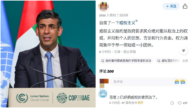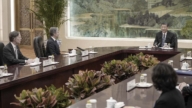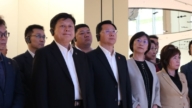【新唐人2014年05月07日讯】中共总理李克强5月4号开始非洲四国之行。近年,中国公司跟非洲当地人冲突不断。李克强临行前承认中非关系面临问题,在非洲的中国公司正遭遇“成长的烦恼”。外媒评论说,中共在非洲的所作所为带有“殖民主义”意味。
李克强周日在启程非洲前,先对非洲当地2,500多家中国公司喊话,要他们严格遵守当地的法律、法规,对工程、商品质量及消费者负责,还要对当地社区和环境“承担应尽的责任”。
《美联社》报导披露,围绕着中国公司在非洲被指控建筑粗制滥造、不尊重当地劳工和其他法律方面问题,中国公司在当地已引发紧张。有指控说,中共在这里无所不在的影响,已有相当的“殖民主义”意味。
英国《路透社》则报导说,随着中共寻求扩大获取石油和铜等关键商品的渠道,中国企业在非洲大笔投资基础设施、矿业和能源项目。一些中国公司被控不公平对待当地雇员。而位于乍得和尼日尔的两个中国投资项目,石油工人三月份罢工,抗议不平等薪资。
2009年,中国取代美国,成为非洲最大的贸易伙伴,但是北京被控阻碍非洲大陆的经济发展,专注于追求原材料,而不是创造当地的就业和市场。
美国“纽约城市大学”政治学教授夏明指出,从60年代开始,中共就跟非洲建立起紧密的关系,当时,中共面临苏、美两国夹击,为了摆脱自己的孤立地位,所以跟第三世界国家,尤其是非洲走的很近。当时中共通过无偿援助,在非洲开辟了外交战线。
美国纽约城市大学政治学教授夏明:“中国(中共)今天把非洲更多的看成是中国所需要的食品和能源的供应基地。我们看到中国在非洲进行的活动主要是集中在资源的开发。所以这种对非洲资源的攫取,恐怕跟西方传统的做法又没有什么区别了。”
第二次世界大战之后,西方国家已经逐渐摆脱帝国主义,转而更多关心非洲的人权、民主以及可持续性发展。
夏明:“我们看到,中国在非洲的发展战略——殖民主义倾向,尤其在国际大背景下,显得更为突出。所以我们就看到,中国在非洲的投资建厂,它基本上是全部从中国这边,不仅是输出原料,输出资本,而且从中国输出劳工。这样中国在非洲的投资基本上跟当地的经济就没有融合的这么紧,它相反建立一个独立的王国,跟当地老百姓造成许多冲突。”
《美联社》报导,去年赞比亚政府没收了一家由中国公司运营的煤矿控制权,因为中国经理没有回应赞比亚当局,对安全、健康和环境担忧的相关问题。
而2010年,一起劳工纠纷中,两名来自中国的煤矿经理被控枪击矿工,在后来的冲突当中,又有一名中国工人被杀,两人受伤。
夏明表示,中国公司跟当地人的纷争,反映出中共跟非洲的关系有许多矛盾,尤其是非洲本土居民认为,中共实行掠夺性政策,不顾当地资源,也不顾当地经济可持续性发展,甚至给当地造成二元经济,所以当地许多人认为,中共在非洲的扩张投资带有“新殖民主义”色彩。
中共声称在非洲奉行的政策是不干涉别国内政。夏明指出,中共跟非洲许多专制国家包括苏丹、安哥拉、尼日利亚有很多投资合作项目。
夏明:“这里边有许多跟当地政府官员其实都是通过行贿、受贿,跟当地官员进行私下勾兑,给国家机器浇上润滑油,它能够进行运作。所以中国在跟非洲的合作中,必定面临一个很重要的问题,在于中国跟非洲许多国家都是不透明的,治理体系都非常腐败的。”
夏明表示,中共很多高级官员,包括前四川省委副书记李春城的下台,都跟非洲援建计划和提供非洲优惠贷款里面出现的腐败有关。在这种情况下,中共跟非洲的合作,其中结构性的腐败,显然不是李克强对中国在非洲的公司喊话所能解决的。
采访编辑/秦雪 后制/李勇
Li Keqiang Admits To Experiencing Growing Pains in Africa Investment
Chinese Premier Li Keqiang began his four-nation tour
in Africa on May 4.
In recent years, Chinese companies in Africa have had
many conflicts with locals.
Prior to his departure, Li acknowledged the investment
in Africa is experiencing growing pains.
Foreign media referred to it as ‘colonialism’
by the Communist regime.
Before leaving China, Li urged the 2,500 Chinese companies
in the continent to, “strictly abide by local laws
and regulations, hold themselves accountable for the quality
of their projects and goods and to consumers, and ‘shoulder
due responsibility’ for local communities and the
environment", according to the official Xinhua News Agency.
Associated Press reported that, “tensions exist around
allegations of shoddy construction and a lack of respect for
employment and other local laws."
“China has also faced allegations that its pervasive influence
has more than a whiff of colonialism about it", said AP.
Reuters also reported that, “Chinese enterprises have spent
heavily on infrastructure, mining and energy projects in Africa
as the country seeks to expand its access to supplies of vital
commodities such as oil and copper.
Chinese firms have been accused of treating
local staff unfairly.
Oil workers at two China-invested projects in Chad and Niger
went on strike in March in protest against unequal pay."
“In 2009, China overtook the United States as Africa’s biggest
trading partner.
Beijing has been accused of holding back the continent’s
economic development by focusing on the pursuit of raw
materials rather than the creation of local jobs and markets",
reported Reuters.
Xia Ming, professor of political science at the City University
of New York, indicates that since the 1960s, the CCP has
established a close relationship with African nations.
To shake off its isolated status from the United States
and the Soviet Union, the CCP tried to form ties with
third World countries, especially those in Africa.
The CCP opened a diplomatic front by providing aid
to Africa.
Professor Xia Ming, Political Science, The City University
of New York: “Africa is more of a food and energy
supply base to the CCP.
We can see that main activities in Africa
revolve around resources.
This grab for Africa’s resources is very much like
the traditional Western approach."
After World War II, Western nations gradually broke away
from imperialism, paying more attention to human rights,
democracy and sustainable development in Africa.
Professor Xia Ming: “We see China’s strategy in Africa,
colonialist tendencies, is very prominent, especially
in the international context.
That’s why we see that the investment in Africa is basically
entirely an output from China, from the raw materials,
to capital and even labor.
That way, the Chinese investments have very little integration
with the local economy, and have become
an independent kingdom.
Naturally, this has caused conflicts with locals."
AP reported that, “last year, Zambia’s government
seized control of a Chinese-run coal mine, saying
Chinese managers had failed to address safety, health
and environmental concerns."
“In 2010, two Chinese managers there were accused
of shooting miners during a labor dispute, and later clashes
reportedly saw one Chinese worker killed and two others
injured", according to AP.
Xia Ming indicates that the conflicts between Chinese
companies and locals reflect the many contradictions
between the CCP and Africa.
Africans believe that the CCP’s policy has been predatory,
lacks concern for local resources, local economic
sustainability, and has even created a dual economy
for the locals.
Many locals believe the CCP’s investment
is colored with neo-colonialism.
The CCP claims its policies do not interfere
in African domestic affairs.
Xia Ming argues that in fact, the CCP has many projects
with tyrannical African countries such as Sudan,
Angola and Nigeria.
Xia Ming: “There are many investments involving bribery
to local officials to ensure smooth operation
in those countries.
Both China and Africa face the same issue
in their collaboration.
Both sides are opaque and corrupt regimes."
Xia Ming explained that many CCP officials were sacked
for getting involved in the corruption cases associated with
construction and aid to Africa, such as former deputy
secretary of Sichuan, Li Chuncheng.
Therefore, the structural corruption in the relationship
between China and Africa is a problem that cannot simply
be resolved with Li Keqiang’s propaganda talk.
Interview & Edit/Qin Xue Post-Production/Li Yong





























